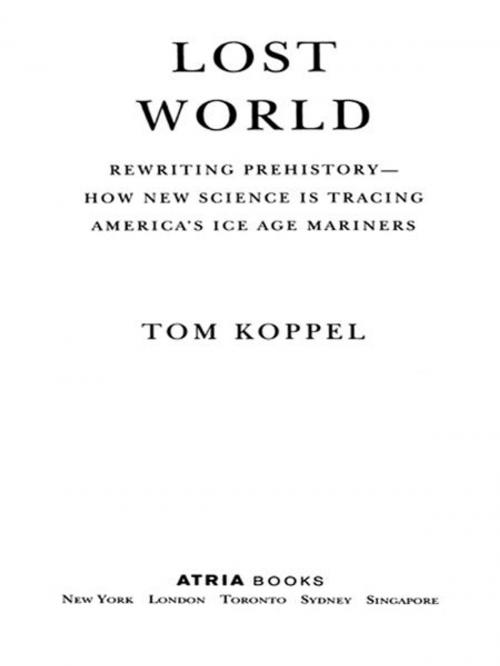Lost World
Rewriting Prehistory---How New Science Is Tracing
Nonfiction, Science & Nature, Science, Other Sciences, History| Author: | Tom Koppel | ISBN: | 9781439118009 |
| Publisher: | Atria Books | Publication: | May 11, 2010 |
| Imprint: | Atria Books | Language: | English |
| Author: | Tom Koppel |
| ISBN: | 9781439118009 |
| Publisher: | Atria Books |
| Publication: | May 11, 2010 |
| Imprint: | Atria Books |
| Language: | English |
For decades the issue seemed moot. The first settlers, we were told, were big-game hunters who arrived from Asia at the end of the Ice Age some 12,000 years ago, crossing a land bridge at the Bering Strait and migrating south through an ice-free passage between two great glaciers blanketing the continent. But after years of sifting through data from diverse and surprising sources, the maverick scientists whose stories Lost World follows have found evidence to overthrow the "big-game hunter" scenario and reach a new and startling and controversial conclusion: The first people to arrive in North America did not come overland -- they came along the coast by water.
In this groundbreaking book, award-winning journalist Tom Koppel details these provocative discoveries as he accompanies the archaeologists, geologists, biologists, and paleontologists on their intensive search. Lost World takes readers under the sea, into caves, and out to the remote offshore islands of Alaska, British Columbia, and California to present detailed and growing evidence for ancient coastal migration. By accompanying the key scientists on their intensive investigations, Koppel brings to life the quest for that Holy Grail of New World prehistory: the first peopling of the Americas.
For decades the issue seemed moot. The first settlers, we were told, were big-game hunters who arrived from Asia at the end of the Ice Age some 12,000 years ago, crossing a land bridge at the Bering Strait and migrating south through an ice-free passage between two great glaciers blanketing the continent. But after years of sifting through data from diverse and surprising sources, the maverick scientists whose stories Lost World follows have found evidence to overthrow the "big-game hunter" scenario and reach a new and startling and controversial conclusion: The first people to arrive in North America did not come overland -- they came along the coast by water.
In this groundbreaking book, award-winning journalist Tom Koppel details these provocative discoveries as he accompanies the archaeologists, geologists, biologists, and paleontologists on their intensive search. Lost World takes readers under the sea, into caves, and out to the remote offshore islands of Alaska, British Columbia, and California to present detailed and growing evidence for ancient coastal migration. By accompanying the key scientists on their intensive investigations, Koppel brings to life the quest for that Holy Grail of New World prehistory: the first peopling of the Americas.















